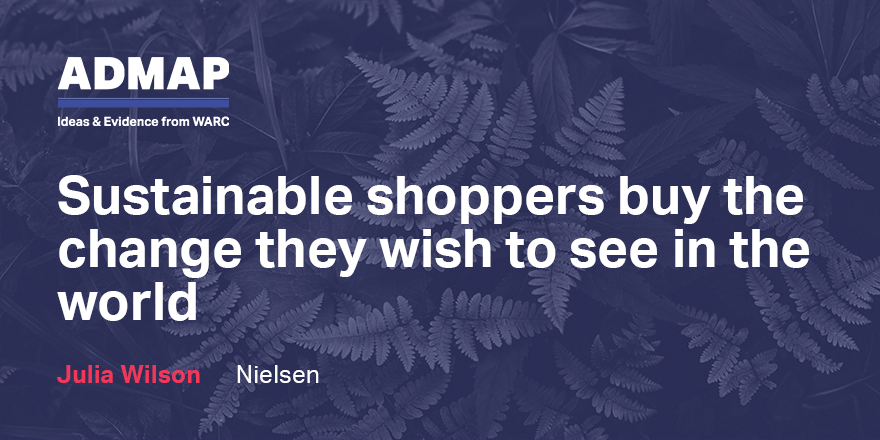Getting involved in cause-based marketing is nowadays a priority for businesses, as brands that ‘do good’ through corporate social responsibility are continuing to increase in popularity. This month’s issue of Admap, WARC’s monthly thought leadership report, explores sustainability: opportunities and challenges for brands.
A challenge that marketers can no longer ignore, Admap presents ten articles by experts from across the globe who share their knowledge and advice on this vital topic.
Julia Wilson, Vice president, global responsibility & sustainability, Nielsen, looks at how Sustainable shoppers buy the change they want to see in the world, through identifying the forces of change driving the sustainability movement, the environmental challenges impacting people around the world and how governments and corporations are responding. This condensed version of Nielsen’s report revealed that 81% of global respondents feel strongly that companies should help improve the environment, matching an upward trend in corporate sustainability and proving that companies will need to ensure they are putting consumer needs at the centre of their strategy if they want to stay relevant.
According to David Droga, founder and chairman, Droga5, “Too many brands don’t want to offend anybody, so they try to take a stand for something but effectively they stand for nothing.” In Building brands in a transparent age, he argues that brands must get behind something that’s true to themselves, the category they’re in, what they believe and what they can contribute to, while ensuring they avoid aligning with a popular cause before having fixed such issues within their own organisation.
Rachel Barton, Masataka Ishikawa, Kevin Quiring and Bill Theofilou, Accenture Strategy explain Why purpose is key to competitive agility. Accenture’s global survey of nearly 30,000 consumers found that 62 percent of customers want companies to take a stand on current and broadly relevant issues like sustainability, transparency or fair employment practices. These expectations for brand alignment also present an opening for companies to demonstrate their competitive agility. The opportunity lies in building more authentic and profitable relationships with customers.
In Tackling global challenges through cause-related marketing: How brands should promote their support to social causes, Benedetta Crisafulli, Jaywant Singh and La Toya Quamina investigate how consumers respond to guilt-arousing messages in cause-related advertising and what level of guilt appeal intensity is most effective in cause marketing campaigns. Their empirical research revealed that “consumers do not identify with the advertised brand if exposed to intense, ‘in-your-face’ guilt-arousing messages” and, consequently, the authors advise brands to communicate their genuine motives, ensure cause-brand compatibility and be realistic about the outcomes.
Changing people’s behaviour to be more environmentally and socially responsible is a huge challenge. In Saving the planet nudge by nudge: Using behavioural economics to create effective communications for a sustainable future, Crawford Hollingworth and Sarah Murray of The Behavioural Architects reveal how behavioural economics can provide strategies for effective communications that go beyond shifting attitudes to altering behaviours.
Fiona Ball, Group Head of responsible business, Sky, notes how telco Sky has the unique opportunity to connect with millions of people and help share important, change-driven messages in Sustainability across the business at Sky. She details how, in 2017, Sky realised the huge impact that single-use plastic waste was having on the world’s oceans, which led to the launch of Sky Ocean Rescue, an initiative that vowed to make the entire business single-use plastic free by 2020.
In Sustainability and recycling-by-design, Mark Curtis, Chief client officer, Fjord, examines the circular economy, which focuses on minimising waste and making the most of resources by keeping them in use for as long as possible. He notes that “applying circular economy principles at scale could bring an estimated savings of £523 billion for European companies alone”, therefore designing for ecosystems must be at the heart of rethinking how organisations approach the supply chain.
In How mainstream eco-brands can suffer at the shelf, Stacy Wood, Stefanie Robinson and Morgan Poor argue mainstream brands that advertise their greenness probably won’t perform well compared to niche green brands who “may be seen as more authentically able to focus on environmental friendliness without sacrificing performance”. The authors draw on research which states that while green brands are popular in the marketplace, consumers often see a trade-off between a product’s get-the-job-done performance and its moral, environmental friendliness.
In 2019's post-plastic landscape, brands will need to move beyond simplistic messaging and token gestures and embrace systemic change says Duncan Baizley, Senior commissioning editor, WGSN, in Sustainability and the consumer in 2019. He unpacks three of the seven sustainability trends that were identified in WGSN’s Sustainability and the Consumer 2019 report: corporate action lagging behind consumer sentiment, zero tolerance for waste and non-recyclable packaging causing a barrier to purchase.
Today’s modern consumer wants the brands they buy to have a positive impact on the world and, Chris Arnold, founder, Creative Orchestra, argues in Why doing good is good for business, that brands are responding in different sectors and through different strategies to meet these new demands.
WARC subscribers can access a deck which summarises the expertise and advice from all our authors. And look out for Q&A videos with some of our authors.


